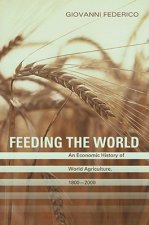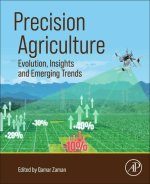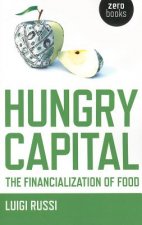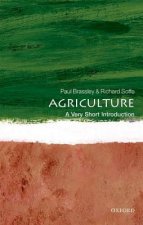
Kód: 14279461
Rethinking Food Systems
Autor Lea Brilmayer, Priscilla Claeys, Nadia C. S. Lambek, Adrienna Wong
Taking as a starting point that hunger results from social exclusion and distributional inequities and that lasting, sustainable and just solutions are to be found in changing the structures that underlie our food systems, this bo ... celý popis
- Jazyk:
 Angličtina
Angličtina - Vazba: Brožovaná
- Počet stran: 250
Nakladatelství: Springer, 2016
- Více informací o knize

3313 Kč

Skladem u dodavatele v malém množství
Odesíláme za 12-17 dnů
Potřebujete více kusů?Máte-li zájem o více kusů, prověřte, prosím, nejprve dostupnost titulu na naši zákaznické podpoře.
Přidat mezi přání
Mohlo by se vám také líbit
Dárkový poukaz: Radost zaručena
- Darujte poukaz v libovolné hodnotě a my se postaráme o zbytek.
- Poukaz se vztahuje na celou naši nabídku.
- Elektronický poukaz vytisknete z e-mailu a můžete ihned darovat.
- Platnost poukazu je 12 měsíců od data vystavení.
Více informací o knize Rethinking Food Systems
Nákupem získáte 331 bodů
 Anotace knihy
Anotace knihy
Taking as a starting point that hunger results from social exclusion and distributional inequities and that lasting, sustainable and just solutions are to be found in changing the structures that underlie our food systems, this book examines how law shapes global food systems and their ongoing transformations. Using detailed case studies, historical mapping and legal analysis, the contributors show how various actors (farmers, civil society groups, government officials, international bodies) use or could use different legal tools (legislative, jurisprudential, norm-setting) on various scales (local, national, regional, global) to achieve structural changes in food systems. Section 1, Institutionalizing New Approaches, explores the possibility of institutionalizing social change through two alternative visions for change - the right to food and food sovereignty. Individual chapters discuss Vía Campesina's struggle to implement food sovereignty principles into international trade law, and present case studies on adopting food sovereignty legislation in Nicaragua and right to food legislation in Uganda. The chapters in Section 2, Regulating for Change, explore the extent to which the regulation of actors can or cannot change incentives and produce transformative results in food systems. They look at the role of the state in regulating its own actions as well as the actions of third parties and analyze various means of regulating land grabs. The final section, Governing for Better Food Systems, discusses the fragmentation of international law and the impacts of this fragmentation on the realization of human rights. These chapters trace the underpinnings of the current global food system, explore the challenges of competing regimes of intellectual property, farmers rights and human rights, and suggest new modes of governance for global and local food systems. The stakes for building better food systems are high. Our current path leaves many behind, destroying the environment and entrenching inequality and systemic poverty. While it is commonly understood that legal structures are at the heart of food systems, the legal academy has yet to make a significant contribution to recent discussions on improving food systems - this book aims to fill that gap.
 Parametry knihy
Parametry knihy
Zařazení knihy Knihy v angličtině Economics, finance, business & management Industry & industrial studies Primary industries
3313 Kč
- Plný název: Rethinking Food Systems
- Podnázev: Structural Challenges, New Strategies and the Law
- Autor: Lea Brilmayer, Priscilla Claeys, Nadia C. S. Lambek, Adrienna Wong
- Jazyk:
 Angličtina
Angličtina - Vazba: Brožovaná
- Počet stran: 250
- EAN: 9789402407716
- ISBN: 9402407715
- ID: 14279461
- Nakladatelství: Springer
- Hmotnost: 4102 g
- Rozměry: 235 × 155 × 14 mm
- Datum vydání: 18. September 2016
Oblíbené z jiného soudku
-

Extra Virginity
722 Kč -

Carbon Farming Solution
1425 Kč -

Looting Machine
254 Kč -

Lean Farm
679 Kč -

Extra Virginity
400 Kč -

Enriching the Earth
1076 Kč -

Soil Microbiology, Ecology and Biochemistry
2443 Kč -

Minerals for the Genetic Code
606 Kč -

Farm Business Management
8307 Kč -

Timber: Loggers Challenge the Great Northwest Forests
353 Kč -

Elements of Petroleum Geology
2609 Kč -

Nature's Perfect Food
1031 Kč -

Market-Based Fisheries Management
1681 Kč -

Cartographic Science
2547 Kč -

Extra Virginity
410 Kč -

Feeding the World
1339 Kč -

Responsible Mining
1626 Kč -

Dictionary of Agriculture and Land Management
609 Kč -

Fundamentals of Horticulture
1720 Kč -

Handbook of Global Agricultural Markets
3313 Kč -

Mining Industry
2309 Kč -

Unmanned Aerial Systems in Agriculture
5225 Kč -

Food and Agricultural Tourism
1697 Kč -

Grain Markets in Europe, 1500-1900
1257 Kč -

Bengal Agriculture 1920-1946
1257 Kč -

Fish versus Power
1257 Kč -

Waste
705 Kč -

Overfishing
410 Kč -

Modern Management in the Global Mining Industry
1706 Kč -

CABI Encyclopedia of Forest Trees
10656 Kč -

Handbook of Liquefied Natural Gas
3308 Kč -

Tomorrow's Table
568 Kč -

GIS Fundamentals
2909 Kč -

Poplars and Willows
9211 Kč -

Handbook of Natural Gas Transmission and Processing
4718 Kč -

Agri 4.0 and the Future of Cyber-Physical Agricultural Systems
4940 Kč -

Precision Agriculture
3632 Kč -

Biochar Production for Green Economy
5830 Kč -

Minerals, Collecting, and Value across the US-Mexico Border
895 Kč -

International Cocoa Trade
5633 Kč -

Commodity Derivatives
5474 Kč -

Forest Fungi
4496 Kč -

Anthropology of Food - The Social Dynamics of Food Security
1137 Kč -

Hungry Capital
409 Kč -

Agricultural Economics & Agribusiness 8e (WSE)
7646 Kč -

Cherries
6924 Kč -

Stone Matrix Asphalt
2547 Kč -

Tropical Babylons
1459 Kč -

Agriculture: A Very Short Introduction
323 Kč
Osobní odběr Praha, Brno a 12903 dalších
Copyright ©2008-24 nejlevnejsi-knihy.cz Všechna práva vyhrazenaSoukromíCookies



 Vrácení do měsíce
Vrácení do měsíce 571 999 099 (8-15.30h)
571 999 099 (8-15.30h)